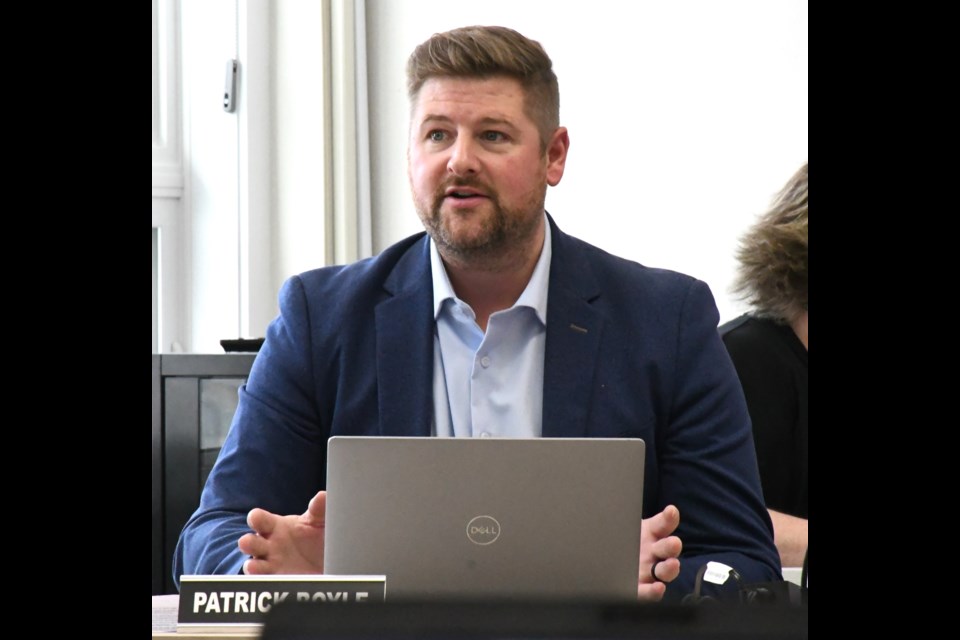Prairie South trustee Patrick Boyle is outraged that the division has received under $500,000 in carbon tax rebates despite shelling out over $1.6 million — operating money the division can’t afford to lose.
“The numbers are pretty alarming, to be honest, (and) I think everyone in this school division should be paying attention to (them),” he said during the March 5 board meeting.
A report from the finance department showed that, from 2018-19 to 2023-24, Prairie South paid $1,672,909 in carbon taxes and received $449,469 in climate action incentive fund (CAIF) money, a difference of $1,223,440. Notably, the federal government distributed CAIF funding in 2019-20 and 2020-21 for energy-saving projects before cancelling the program.
The data showed the division has paid $246,418 in electricity expenses, $891,609 in heating costs and $534,883 in fuel costs. Also, while it expects to pay $515,746 in carbon taxes this year, that number could be less with a mild winter and less energy consumption.
The report added that Ottawa will increase the carbon tax by 23 per cent this April and by 18.75 per cent in 2025, or a 41.75-per-cent increase over two years and increases of roughly 20 per cent annually thereafter.
While the provincial government is disputing with Ottawa over carbon taxes, locally, these numbers will not improve because the tax will increase every April and continue “eating away” at PSSD’s budget, said Boyle.
“And before long, this number goes from $500,000 to $1 million in our budget in a handful of years. That’s a ridiculous number for a school division that we should be standing up (against) … ,” he continued, noting they would be having a different conversation if there was a rebate program in place.
The board — and the wider education industry — talks about classroom complexity and funding, but it’s the federal government that’s “digging a hole” into every school division’s budget, Boyle said.
The trustee pointed out that Prairie South has paid nearly $900,000 in heating costs, whereas Ottawa just gave Atlantic Canada a break on home heating oil costs.
“We’re eating $900,000 right now. These numbers … concern me greatly,” Boyle said, noting the board should make a motion opposing the carbon tax, send it to the Saskatchewan School Boards Association (SSBA), and have the association send it to the national organization.
Trustee Shawn Davidson, an SSBA rep, said the organization has previously analyzed this area but should refresh that data. When he was president, members passed a resolution wanting an assessment of the effect of carbon taxes on schools. The preliminary report showed all divisions would pay roughly $5 million in total.
Ottawa offered CAIF as a carrot for divisions to make energy-efficient upgrades but decided to “rip away the carrot and eat it and beat you with a stick after,” he continued.
Davidson added that paying $500,000 annually is a “serious chunk of change,” and while that represents only 0.5 per cent of the budget, it’s still “ridiculous.”
With all the money that Saskatchewan’s school divisions have spent on carbon taxes, that funding probably could have been used to address classroom size and complexity issues, said Boyle.
School boards should ask their MPs about the carbon tax and why the federal government has discontinued CAIF, he continued. Meanwhile, he thought Ottawa should keep the rebate cheques because that money isn’t supporting kids in classrooms — which is “flat-out wrong” to him.
“And this has really got me quite worked up because there is no reasoning for it … ,” Boyle added. “I think we all need to get on board with this because this is outrageous to me.”
This report shows how the carbon tax program is hurting Prairie South, especially since CAIF no longer exists, said trustee Crystal Froese. It initially sounded like a good idea, considering Ottawa promised to return some money for energy efficiency projects — which Prairie South has done at its own expense.
“So the climate action incentive fund is a failure … ,” she added. “That’s really unfortunate, too.”
The next PSSD board meeting is Tuesday, April 9.




